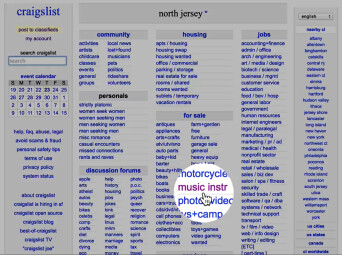Compared to eBay, Craigslist is like the Wild West. Whereas the former is governed by strict rules and regulations, Craigslist is basically a free for all. It offers you the opportunity to sell in your local area, with little or no expense. However, it also opens you up to a number of potential problems that you wouldn’t have on eBay.
Person to person
Craigslist is not really that different from an old-school newspaper classified ad section, except that it’s free, and you can include pictures. You list the instrument or other gear you want to sell and include an email address (more on that later), interested buyers contact you, and you setup a meeting to show them the item and hopefully sell it.
Selling on Craigslist is advantageous because there’s no commission on the sale, whereas eBay and Pay Pal together will take about 13% of the sale price. It’s also potentially a much faster way to sell, as it’s almost always a face-to-face transaction and doesn’t involve waiting for auctions to end, waiting for the buyer to pay, and waiting to get your money from PayPal, all of which you’d face on eBay.
But on eBay you have relative anonymity, and never have to actually meet the buyer. On Craigslist, unless you work out your own shipping or delivery arrangement, the buyer comes to your house or apartment (or some other meeting place that you designate) to check out the item and potentially buy it on the spot.
There are no rules and regulations for Craigslist sales, other than any state or local consumer protection laws, and Craigslist offers no way to arbitrate disputes. If something goes wrong, you often have little recourse. Although the great majority of Craigslist users are honest citizens, the site has spawned an underbelly of rip-off artists, spammers, and other lowlifes, from which you must protect yourself.
Listing and pricing
Placing a Craigslist ad is easy. You set up a free account, choose the category (you’ll want For Sale/Musical Instruments) and post text and a nice looking photo. As we recommended in the installment about eBay, try to use natural light to take your photo, as flash photos of gear and instruments usually look terrible. Write a good and enticing description. If there are major flaws with the item, mention them now.
You want your item to attract attention, which normally would mean pricing it aggressively. However, Craigslist has spawned a culture of low-balling, so make sure to leave enough room in your price to come down a little bit without going below the lowest number you’d accept.
It’s in the mail
Consider creating a separate email account that you’ll only use for your listings. If you use your regular email, you’re likely to get a variety of spam, which you probably don’t want going into your everyday email account. Gmail and Yahoo make it very easy to create accounts, so before you sell on Craigslist, create a dedicated email address.
Craigslist spam is usually cloaked in the form of a buy request. You can tell it from the real thing because it doesn’t mention your specific item, since it’s generic spam sent out to thousands of Craigslist sellers. Craigslist experts suggest that you put a requirement in your ad that buyers either mention your item specifically, or give you their phone number in their email replying to your add. Otherwise, ignore the message, because odds are the sender is trying to fleece you out of your money, usually with a scam that involves you shipping the item overseas.
Knock knock
Since the buyer comes to your house or apartment to check out and hopefully purchase the item you’re selling, you have to be careful. Although it’s rare, there have been robberies of Craigslist sellers, or the “buyer” could be coming to case your place for a later burglary. For non-musical items, it’s often advisable to have the seller meet you in your driveway (if you have one) or somewhere right outside your residence — or even in a neutral spot like a coffee shop if it’s a small item being sold — instead of inside.
However, for instruments and musical gear, which respondents to your ad are going to want to test out before buying, you’re probably going to have to let them inside some part of your residence. My advice is to not show that you have a studio, if at all possible. If you’re selling say, an electric guitar or a hardware synth, setup an amp in a room other than your studio (a garage is perfect for this) and let them try it out there.
If you know in advance that you’re going to have to let them in your studio, insist on talking to them on the phone first. You can get a better idea of how legitimate they are from having a conversation than through just an email.
The website LifeHacker has an informative article on avoiding trouble with Craigslist sales, in which they offer these safety tips for when a buyer comes over:
- Leave your door open during the sale so if there’s a problem you can be heard.
- Have a friend (or two) with you when the sale is being made. If you have to be alone, have a friend call to check in with you during the sale or just keep them on the line during the sale in case something happens.
- If you live in an apartment, give your address but not your apartment number and meet the buyer outside first. (If you live in a house, you can meet them outside anyway.) In the event that you meet them and they’re making you very uncomfortable, send them on your way and go back inside. You run the risk of being rude and you lose a potential buyer, but if you are not comfortable talking to a person outside of your home then you should not invite them in. (For the record, it’s very unlikely you will ever have to do this, but it’s good to give yourself the option just in case).
Cash on the barrelhead
For the most part, Craigslist is a cash market. Yes, it presents some problems for potential buyers to have to bring cash for an expensive item to a stranger’s house, as they have the same insecurities about doing a transaction with a stranger as you do. Still, if you take a check, you’re going to get burned in many situations. You could insist on a cashier’s check, or postal money order but unless the buyer is willing to let you accompany him or her to the bank or post office to see that its legitimately obtained, it could be a forgery.
Another option is to use PayPal or some other online financial transaction service. The buyer could make the payment from his or her phone and you could wait for confirmation before handing over the item. Still, cash is the best way to go.
If you’re comfortable with its face-to-face nature and potential pitfalls, Craigslist offers you the opportunity to sell gear without incurring expenses. It’s not for everyone, but it can be a fast and effective way to sell.
We hope this series has been helpful to you. And don’t forget that Audiofanzine has its own free gear classifieds, where you can sell directly to other members.


